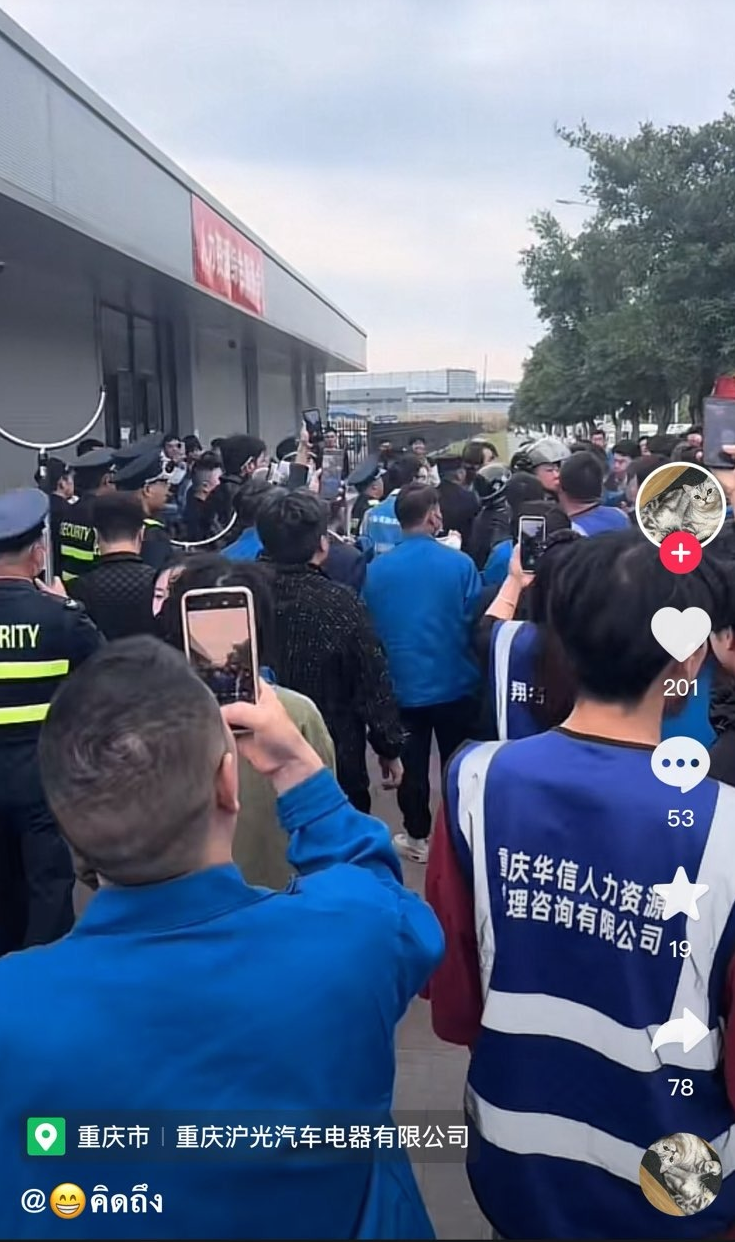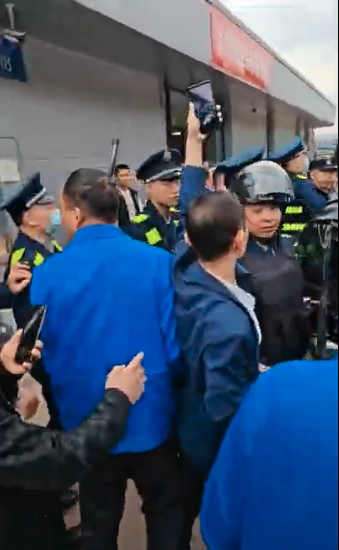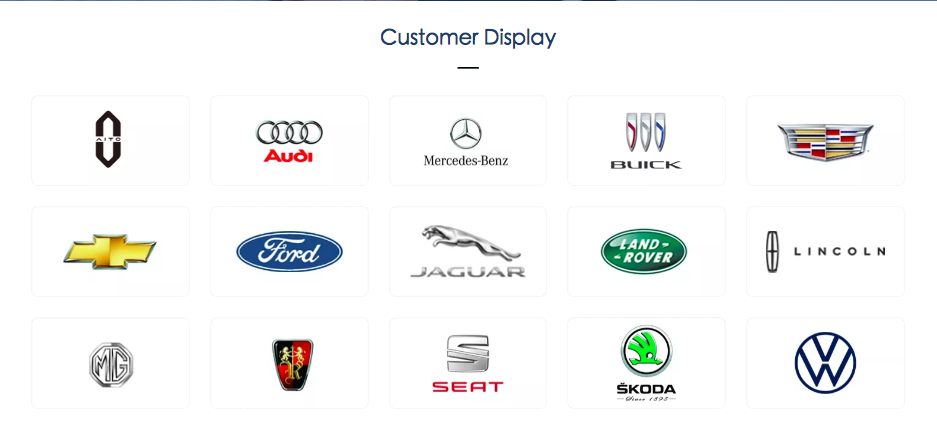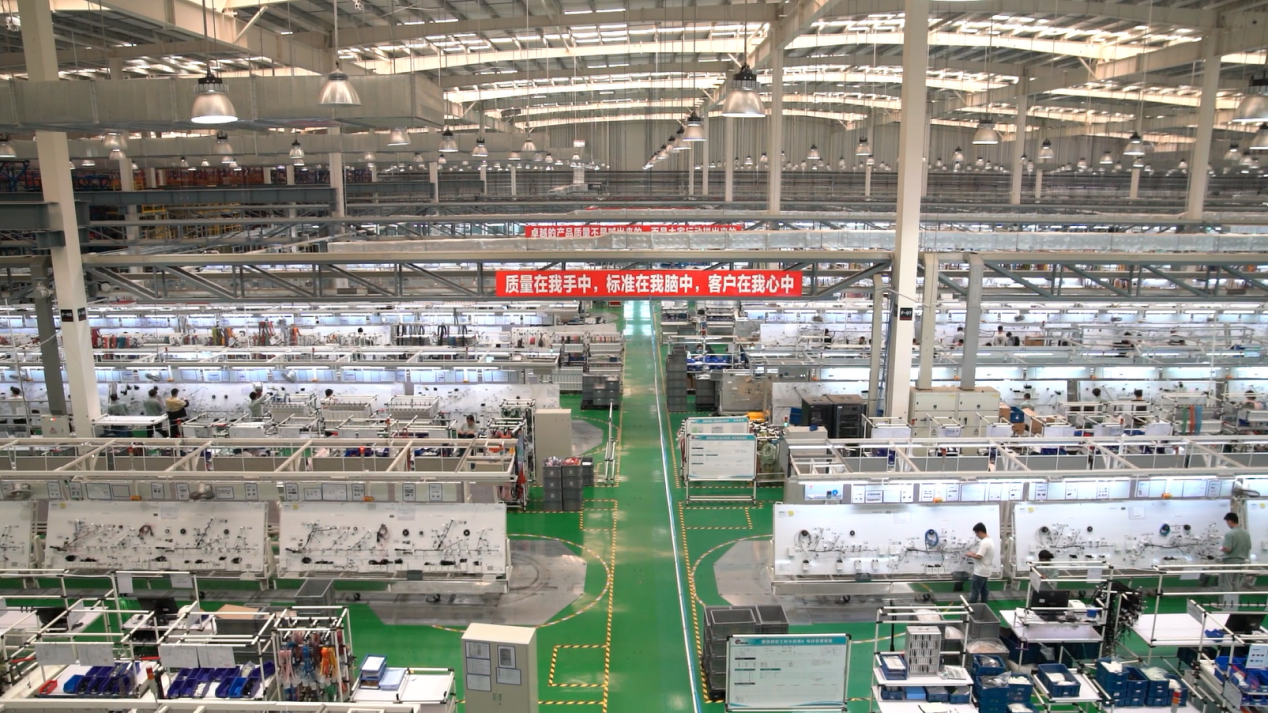In late March 2024, the auto parts supplier Chongqing Huguang saw a large number of hourly workers gathering outside the factory gate to protest against the factory’s failure to arrange work shifts, which meant that workers could not complete enough working hours to receive the gratuity. Factory security with helmets and restraining poles were seen confronting the workers on online videos.
China Labour Bulletin (CLB) found that Chongqing Huguang’s parent company is a supplier of auto OEMs including Volkswagen, Audi and Mercedes-Benz. CLB identified several possible labour violations, regarding its employment practices, excessive working hours, and union’s inaction. German companies in its downstream have a responsibility to conduct due diligence in accordance with the requirements of the German Supply Chain Act.


Photo: workers protesting at the factory gate of Chongqing Huguang in March 2024
In late March 2024, Chongqing Huguang Automotive Electrical Co., Ltd. (Chongqing Huguang in the following) saw a large number of hourly workers gathering outside the factory gate to protest against the factory’s failure to arrange work shifts, which meant that workers could not complete enough working hours to receive the gratuity. Factory security with helmets and restraining poles were seen confronting the workers on online videos.
China Labour Bulletin (CLB) found that Chongqing Huguang’s parent company is a supplier of auto OEMs including Volkswagen, Audi and Mercedes-Benz. CLB conducted an investigation and identified several possible labour violations, regarding its employment practices, excessive working hours, and union’s inaction. German companies in its downstream have a responsibility to conduct due diligence in accordance with the requirements of the German Supply Chain Act (i.e. Act on Corporate Due Diligence Obligations in Supply Chains).
Workers deceived by the company on hourly wage and gratuity
The parent company of Chongqing Huguang, Kunshan Huguang Automotive Electrical Co., Ltd. (Kunshan Huguang in the following), was listed as “Huguang Corporation” in 2020 and has branches in the US, Germany, and other locations. Its customers include auto OEMs from Germany, the US, and the UK, such as Volkswagen, Audi, Mercedes-Benz, General Motors, Ford, Jaguar, and Land Rover. It has been rated as an A-level supplier by many of these car companies.

Photo: customers of Kunshan Huguang Automotive Electrical Co., Ltd.
On its official website, Kunshan Huguang claims to be “worker-centric“. The protest in March 2024 counters this claim, as hourly workers gathered at the factory gate to demand their gratuity after two months of recruitment.
Worker comments and recruitment advertisements showed that they were promised an hourly wage of 24-30 yuan and a gratuity of about 4000-6000 yuan after completion of a certain number of hours in Chongqing Huguang. However, the actual hourly wage was only 21 yuan, and workers could only get an hourly wage of 24 yuan after three months’ full attendance. However, it is hard for workers to get full attendance due to the back-breaking work and long working hours in the factory. Workers commented they had to stand for 12 hours or more per day, and could not take sick leave or they would be subjected to financial penalties.
Just as workers were about to reach the hours required to receive the gratuity, the factory forced them to become regular employees (with lower hourly pay) or resign. The factory thus avoided paying the promised gratuity. Also, the factory did not properly lay off workers, but put them on leave. Workers also spoke of wage arrears. After the workers protested, some received their delayed wages based on the hourly wage of 21 or 24 yuan.
Huguang intentionally used hourly workers during peak season, but discard these workers when orders were completed
According to the official website of Chongqing Liangjiang New Area, to ensure the timely delivery of the wiring harness for Huawei’s new energy vehicles Aito M7 and M9, the factory has started production since the first day of Spring Festival in 2024. Chongqing TV reported that the factory had all seven production lines running at full capacity, with “more than a thousand workers working hard and fully engaged in production.” It also highlighted the factory increased its workforce from 700 to 1,200 people in a single day.

Photo: The Chongqing Huguang factory
On its official website, Kunshan Huguang claims to provide “precise and reliable” supply, which can be attributed to its proactive recruitment policy. However, the workers have precarious employment. Chongqing Huguang only pays social insurance for 627 workers even when its production involves more than a thousand workers. There is a high turnover rate for hourly workers. On 1 February 2024, a labour dispatch agency released a video showing around a thousand workers leaving that day. A worker commented under the video, “Huguang is always recruiting. The factory recruits people 365 days a year.”
Even before the protest in March this year, workers in Chongqing Huguang have complained about false promises of wage levels and poor conditions. In January 2023, in an online forum discussion, some netizens pointed out that the agency’s claim of a monthly salary of 7000 yuan was false, and the actual salary received was only 4000-5000 yuan. In another forum discussion in late 2022, a worker said there was no air conditioning in the factory, the temperature was extremely high, and there were even insects in the canteen food.
Possible labour violation on the employment of hourly worker and dispatched worker
Formally speaking, the term “hourly worker” refers to “non-full-time workers“. As explained by the All-China Federation of Trade Unions (ACFTU), non-full-time employment refers to a form of employment where workers are paid by the hour. The average daily working time of these workers should not exceed 4 hours and that weekly working time should not exceed 24 hours. Workers are not entitled to severance pay when laid off. If Chongqing Huguang’s “hourly workers” are non-full-time workers in the legal sense, then their previous “full-force” working hours should have long exceeded the limit and are probably illegal.
Chongqing Huguang’s hourly workers could also be dispatched workers recruited through labour dispatch agencies. This also violates Article 4 of the Interim Regulations on Labor Dispatch, which stipulates that the employing unit should strictly control the proportion of dispatched workers to not exceed 10% of its total workforce.
The 2022 annual report of Kunshan Huguang revealed that the outsourced working hours of the parent company totaled at 30,327 hours. If we calculated this based on an 8-hour workday and a 5-day workweek, this represents over 758 dispatched workers. Whether this involves a number of dispatched workers exceeding the legal limit is worth investigating.
The rush hiring of “hourly workers” sowed the seeds of the labour dispute at the end of March 2024. After completing the orders, the factory stopped arranging work and thus avoided paying gratuity to workers. As workers gathered to protest, the conflict escalated and security forces were out repressing the workers.
The role of official trade union
The Trade Union Law clearly stipulates that unions should “coordinate the labour relations and safeguard the labour rights and interests of the enterprise employees through equal negotiation and collective contract system” (Article 6).
Unions should also “provide assistance and guidance for workers in signing labour contracts with enterprises” (Article 21), and should “demand rectification on behalf of the workers” when an enterprise “infringes upon the labour rights and interests of workers in violation of labour laws and regulations” (Article 23).
Throughout the process of large-scale rush hiring, sudden cessation of work arrangements, and the deployment of security guards to stop workers’ protests, what is the role of Huguang’s enterprise union? The parent company Kunshan Huguang has an enterprise union, but the union chairman Zhu Xueqing also serves as the chairman of the company’s supervisory board. With senior management serving as the chairman of the enterprise union, could there be a conflict of interest in this arrangement?
The need for international brands to conduct due diligence
The German Supply Chain Act requires German companies with more than 1000 employees to take action against human rights violations by their suppliers. German customers of Chongqing Huguang, including Volkswagen, Mercedes-Benz, and Audi, have a responsibility to conduct due diligence on the following issues:
1) Are the “hourly workers” hired on a large scale by Chongqing Huguang at the beginning of the year non-full-time workers? If so, their overtime work would have violated local Chinese laws. What were the terms of the contracts they signed at that time? What were the conditions for receiving the gratuity? If the gratuity was not paid, is it considered wage deduction?
Alternatively, if these hourly workers are considered “dispatched workers”, did Chongqing Huguang sign a two-year labour contract with them as required by law and pay them during periods of suspended work? Did the dispatched workers comprise less than 10% of the total workforce (as required by Article 4 of the Provisional Regulations on Labour Dispatch in China) ?
2) Did the workers have to work 12 hours or more per day in the Chongqing Huguang factory with very few days off? If yes, the factory would have violated the basic provisions on a 40-hour work week (Article 36) plus a maximum of 36 hours of overtime per month (Article 41) stated in the China Labour Law.
3) Who were the security guards armed with restraining poles deployed by the factory during the workers’ protest? What was their authorised scope of action, and did their actions constitute illegal acts beyond the scope of Chinese civil and private security laws? When workers went on strike to seek their legal rights, is the deployment of private security considered a form of suppressing workers’ freedom of association and organising?
4) What started as a simple labour dispute that could have been resolved through negotiation escalated into intense confrontation. The union seems to not have represented the interests of the workers. Is this related to the fact that the chairman of the enterprise union is appointed by the senior management of the company, and does this contradict the principle of freedom of association?
CLB has sent letters to the German OEMs, and the communication is ongoing.
